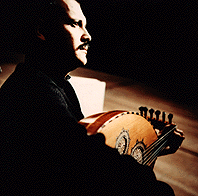In concert at the Globe Festival In Groningen, Netherlands
April 17, 1999
Review by Ton Maas
 Tunisian ud player and composer Anouar Brahem performed at the Globe Festival in Groningen (a provincial capital in the north of the Netherlands). Since it was his first Dutch appearance, a friend of mine and myself made the trip from Amsterdam just to see him. We had already discussed our surprise at the "uneven" programming of the festival, which featured Brahem alongside Salif Keita and Cesaria Evora, plus gypsy queen Esma from Macedonia and Malagasy artists D'Gary and Regis Gizavo. Now of course one can say that's an interesting mix, but to blend the quiet fragility of Brahem's music with the energy of crowd pleasers and festival "tigers" such as Keita and Evora, might not be such a hot idea after all. Upon arrival in Groningen we found that Brahem was one of the opening acts of the festival, programmed in the smaller of the two auditoria. We were lucky to find good seats and waited eagerly for things to come.
Tunisian ud player and composer Anouar Brahem performed at the Globe Festival in Groningen (a provincial capital in the north of the Netherlands). Since it was his first Dutch appearance, a friend of mine and myself made the trip from Amsterdam just to see him. We had already discussed our surprise at the "uneven" programming of the festival, which featured Brahem alongside Salif Keita and Cesaria Evora, plus gypsy queen Esma from Macedonia and Malagasy artists D'Gary and Regis Gizavo. Now of course one can say that's an interesting mix, but to blend the quiet fragility of Brahem's music with the energy of crowd pleasers and festival "tigers" such as Keita and Evora, might not be such a hot idea after all. Upon arrival in Groningen we found that Brahem was one of the opening acts of the festival, programmed in the smaller of the two auditoria. We were lucky to find good seats and waited eagerly for things to come.
Exactly at eight the house lights were dimmed and Brahem walked on stage, followed by Barbaros Erkose (clarinet) and Lassad Hosni (riqq and darabouka). Then they sat down and waited patiently for the crowd to quiet down. As this was a festival, people felt free to move in and out of the room, and since the organizers apparently hadn't realized this potential catastrophe, there was no-one stopping people at the doors. This lasted for maybe five or six minutes. Quite frustrating, I can assure you! In the end the musicians decided to wait no longer and start playing. But the unfortunate setting of their performance turned out to be a continuous plight. After each piece, dozens of people got up and left, replaced by others (though the latter were steadily decreasing in numbers) - leaving the musicians visibly uneasy, irritated and confused by the behavior of their audience. The pause between each piece and the next became somewhat of an intermission, with the musicians patiently waiting and the sound-engineer desperately requesting people to take their seats, "so we can commence with the concert". My friend and I looked at each other in disbelief. Festivals can be mixed blessings indeed - something I never before realized to this extent.
It's hard to tell which effect the whole situation had on the trio's music. I admired their skill, being able to focus in spite of all the distracting noises and movements. The playing was more exuberant and less introverted than on Brahem's ECM albums, but that might say as much about the producer's preferences than about the musicians' mood at this particular event. Brahem proved to be a true virtuoso on his instrument. His playing has the same "effortless" quality as that of Rabih Abou-Khalil, but here the emphasis is on rhythmic fluctuations rather than dynamics, which is quite demanding on the musicians accompanying him. Also, in contrast to his album Conte de l'Incroyable Amour (featuring Erkose and Hosni), the clarinet and percussion played far more prominent roles. Erkose seemed to suffer most from irritation and lack of concentration, especially during slow, rhythmically free intros, as he and Brahem were doubling melodic lines. But at other moments he proved to be in fine form, convincing everyone with his big, warm and incredibly smooth tone. For me however, the great surprise of the evening was Hosni, whose fingers tapped the most amazing complexities out of such seemingly simple instruments as the riqq and darbouka. In sharp contrast to most western rock and jazz drummers and the African drummers which influenced them, an Arabic percussionist can sit quietly and almost motionless, while his fingers perform an intricate dance on the skin of his instrument. Not long ago I had the great pleasure of watching Bijan Chemirani (son of the great Iranian master Djamchid Chemirani) play his zarb, as accompaniment to Moroccan singer Amina Alaoui, wishing I had brought a video camera, just to be able to capture those incredibly elegant dancing hands!
Despite the misery described before, the music transcended its hostile environment. However, a slight nagging feeling remains: of how much better it could have been, given a proper setting for these musicians with a more dedicated audience. When afterwards I had a chance to thank Brahem personally for the concert and to express my dismay at the circumstances, the smile on his face was one of both gratitude, sympathy and encouragement, as if saying: "Hey, life's a bitch, but we did have a good time, didn't we?"
Read a review of Anouar Brahem's recent recording, Thimar